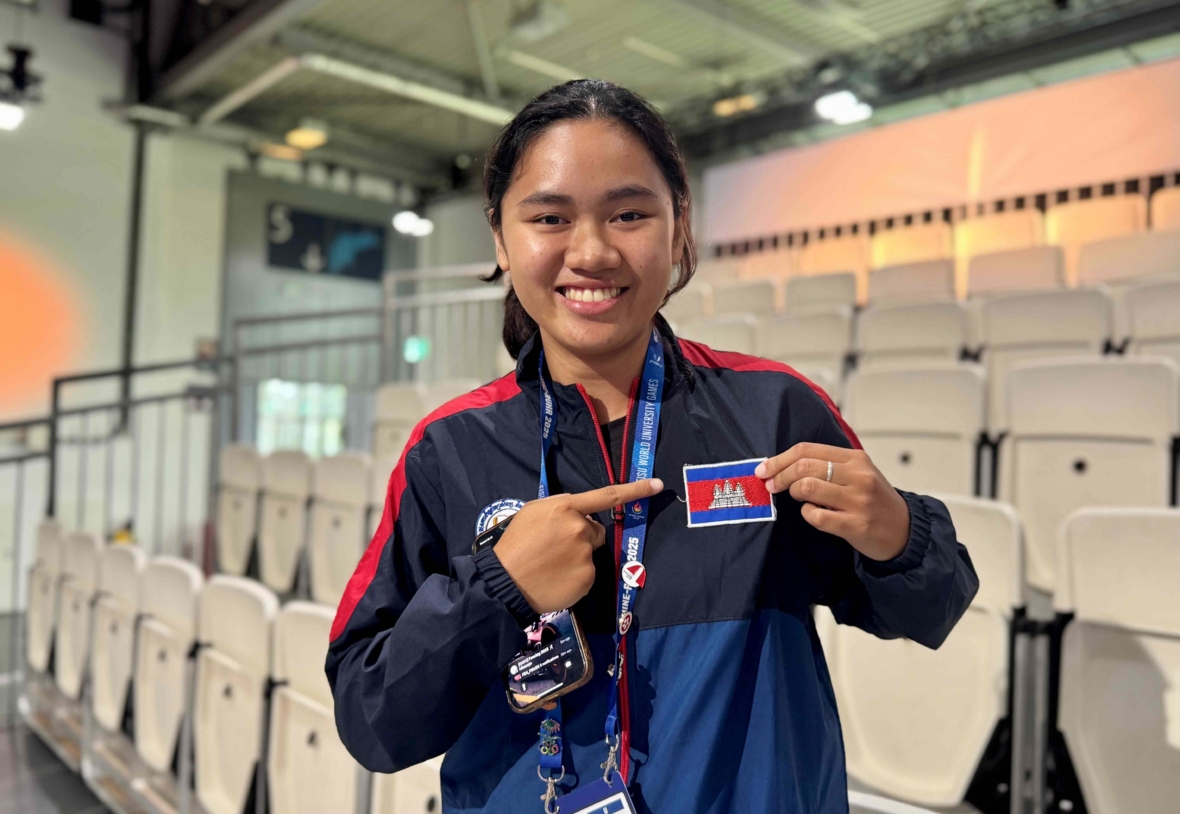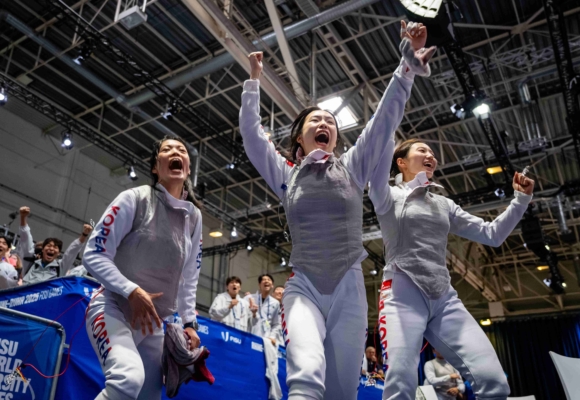On Saturday, 19 July, at the women’s sabre individual event of the Rhine-Ruhr 2025 FISU World University Games, Cambodia’s Pen Narita stepped onto the fencing piste alone.
But she didn’t feel entirely alone.
In her mind, she still heard the voice of her late coach—soft, steady, and still vivid in her mind: “Allez, Narita!”
That voice belonged to Bruno Gaby, a French fencing master who spent the last chapter of his life in Cambodia. Though he passed away in 2023, his teachings live on—in Narita’s movement, her discipline, and her resilience.
“During my last point today, I froze,” said Narita, a finance student from the Institute of Banking Studies in Phnom Penh. “Then I heard him in my head. Bruno always said, ‘If you don’t know what to do, just go for a simple attack.’ So I did. And I won.”
The 5–4 group match victory over Saudi Arabia’s Ahad Bin Muammar wasn’t just a win. It was a quiet moment of belonging—proof that she was meant to be here.
More than a coach
Gaby, a former Olympic referee and lifelong fencing educator, had trained athletes across Europe and Southeast Asia. But in Cambodia, he became more than a technician—he became family.
“He never shouted,” Narita said. “Even when we had nothing, he gave us his old gear. He treated us like his own children.”

Their final phone call, just a month before his death in Indonesia, still replays in her memory.
“He asked, ‘How are we? Is the technical side growing?’ He just wanted to know if we were okay.”
When his wife delivered the news, Narita was heartbroken. But even now, when she fences, she often thinks of his voice—quiet, steady, and encouraging. It feels, at times, as if he’s still there, guiding her hand.
Training on concrete, fencing with honesty
Narita’s path to the FISU Games was paved with hardship—not because she was alone, but because of where and how she trained.
In Phnom Penh, Cambodia’s national fencers often practice on concrete—in parking lots or open school yards. There are no scoring machines to register hits, no lights to signal points, and often, no one to fence with at all.
“We eye everything. If we get touched, we say so. That’s how we fence—on trust.”
A few private clubs exist in the city, but they’re expensive and out of reach for most. Narita trained alone, learning from YouTube and hoping someone—anyone—would say yes to a spar.
“Sometimes I’d ask other athletes, ‘Can you warm up with me?’” she said. “But they were always with their own teams. I felt invisible.”
A bout worth more than a medal
Despite it all, Narita won one of her pool matches at Rhine-Ruhr 2025—that narrow 5–4 victory that meant the world to her.
“I didn’t just win a bout. I proved something,” she said, her voice cracking. “I don’t have a coach. I don’t have facilities. But I still made it here. And I made a point.”
Even though she didn’t advance, she walked away with pride.
“I’m proud of myself,” she said, her voice calm but firm. “Cambodia may not have much, but we have heart.”
A legacy and a future
As Cambodia’s only female sabre fencer, Narita hopes to inspire more girls to pick up the blade—and honour the man who once believed in her. When asked what she would say to Gaby now, she paused, then smiled.
“I did it. I came out of Cambodia. I fought. I won,” she said. “I think you’d be proud of me. I hope you saw it.”
Medallists in the women’s individual sabre event on Saturday included Hayoung Jeon from the Republic of Korea, who took gold, Hungary’s Anna Spiesz with silver, as well as third-place finishers Chirika Takahashi of Japan and Summer Fay Sit from Hong Kong China.
The Rhine-Ruhr 2025 FISU World University Games take place from 16-27 July. Watch all the competitions live on fisu.tv. Click on the link to find the full schedule.
Written by Soyoung Bang, FISU Young Reporter, Korea
The Young Reporters Programme exemplifies FISU’s commitment to more than sports competitions. At every FISU World University Games, a group of talented aspiring sports journalists are chosen to cover the competition.

We warmly thank FISU Official Partner Qiaodan Ltd. which provides remarkable uniforms to FISU Family and International Technical Officials since 2015. Qiaodan is a valuable partner for FISU as it continued to provide its support during the postponement of events due to the global pandemic, and recently extended the relationship with FISU up to and including 2025.



